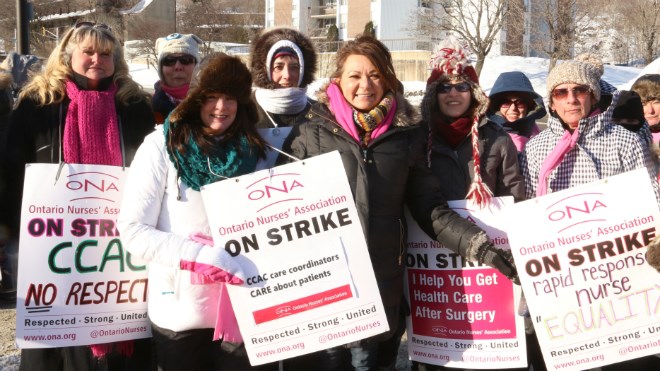Wage parity has been a big issue for Community Care Access Centre (CCAC) nurses on picket lines across the northeast since Jan. 30.
The northeast's 296 striking Ontario Nurses Association (ONA) members have asked for a northern allowance to bring their wages in line with their colleagues at other CCACs, who make $4 an hour more in some cases, with the same job title and level of experience.
NDP Sudbury byelection candidate Suzanne Shawbonquit was out in the cold Monday afternoon to show the striking nurses her support.
“They're not asking for the moon, they're looking for pay equity,” she said. “Why are they not paid at par with equity, like the other CACCs (sic)?”
Lloy Schindeler, the North East CCAC's senior director of clinical services, said the pay equity issue for CCAC nurses in the northeast dates back to 2007, when 42 CCACs across the province were amalgamated into 14.
“We recognize this disparity, and we began working towards closing the gap in our last contract with ONA,” Schindeler said. “Getting to parity is a process, and it's going to have to happen over time.”
The last collective agreement between the province's CCACs and the ONA, which expired March 31, 2014, included a 1.2-per-cent lump-sum payment in the first and second year. In the third year, ONA-represented employees received a 2.75-per-cent wage increase across the board.
The previous collective agreement also included an additional 1.25-per-cent wage increase for employees in the north, to help address the wage gap with their southern colleagues.
The CCACs have said the nurses rejected an offer for lump-sum wage increases, which was comparable to those in collective agreements with the Ontario Public Service Employees Union and the Canadian Union of Public Employees, before collective bargaining between both sides came to an impasse last month.
While nurses – who primarily work as care co-ordinators – have been on strike, Schindeler said care for patients who are already receiving services the North East CCAC should not be impacted.
The North East CCAC contracts out those services to private care providers such as Bayshore Health Services and Red Cross Care Partners, who have their own personal support workers on staff.
But patients who have been discharged from hospital, and need to begin home-care services, will be impacted by the strike, Schindeler said.
“We're working with our health partners to minimize the disruption,” she said.
Managers have taken on care co-ordination duties, and are prioritizing patients who have the most complex medical needs first. Those patients are often frail and elderly.
North East CCAC CEO Richard Joly has come under fire from ONA members, who have cited his salary in 2014, of $288,000, as symbolic of the disparity between management and staff.
Join Sudbury.com+
- Messages
- Post a Listing
- Your Listings
- Your Profile
- Your Subscriptions
- Your Likes
- Your Business
- Support Local News
- Payment History
Sudbury.com+ members
Already a +member?
Not a +member?
Sign up for a Sudbury.com+ account for instant access to upcoming contests, local offers, auctions and so much more.
